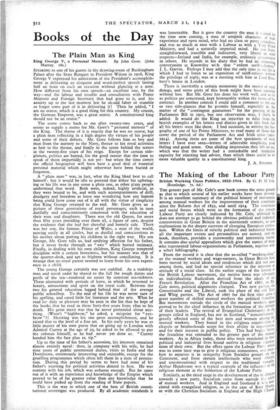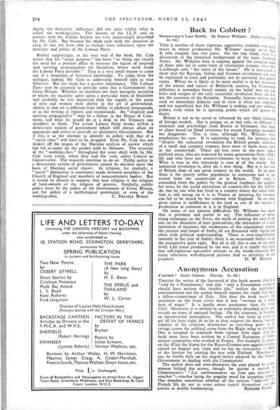The Making of the Labour Party British Working Class Politics,
1832-1914. By G. D. H. Cole. (Routledge. 7s. 6d.) THE greater part of Mr. Cole's new book covers the same ground as that to which several of his earlier works have been devoted. It is an excellent summary of the political history of movements among manual workers for the improvement of their conditions since the Reform Act of 1832, and until 1914. The tendencies and social forces which went to the formation of the present Labour Party are clearly indicated by Mr. Cole, although he does not attempt to go behind the obvious political and industrial controversies in Great Britain in the nineteenth century, to seek explanations in the deeper currents of changing European civilisa- tion. Within the limits of strictly political and industrial history all the important events and personalities are named, and the book, therefore, provides a trustworthy and interesting record. It contains also useful appendices which give the names of those who represented labour-organisations in Parliament, together with a select bibliography. From the record it is clear that -the so-called " working-class," or the manual workers and wage-earners, in Great Britain have been moved by social ideals and tendencies which did not arise among them, and had no special reference to the interests or attitude of a social class. In the earlier stages of the history of the British Labour movement, the motive force was obviously an individualistic Radicalism derived from the ideals of the French Revolution. After the Franchise Act of 1867, as Mi. Cole notes, political alignments changed. Two new parties, the Conservative and the Liberal, took the place of the old Tory and Whig parties. The Act of 1867 for the first time gave a great number of skilled manual workers the political franchise. But movements outside the circle of the manual workers again proved to be the chief influence in the formation of the attitude of their leaders. The revival of Evangelical Christianity in.th groups called in England, but not in Scotland, " nonconformist, greatly affected some of the best men and women among the manual workers. They found in the religious organisation of chapels or brotherhoods scope for their ability in organisation, and for their interest in public policy. This had -begun befog, the franchise was extended to the greater part of the mann!' workers. As in Africa today, those who were restricted in tir political and industrial lives found outlets in religious organ! .sa. tions of their own. But the effect upon the Labour Party vchleu, was to come later was to give it religious connexions, and there" fore to separate it in sympathy from Socialist groups on .tht Continent, and from certain intellectuals who were itheis.5 and unconventional with respect to the traditional moral* Arthur Henderson was a typical example of the influence of Ebe 'religious element in the formation of the Labour Party. Similarly, at the third stage in the development of the tenclendes towards a new party, Socialism came from- outside the circle of manual workers. And in England and Scotland it was ashr ciated with evangelical religion, as in the case of Keir Hardin, or with the Christian Socialism in England of the High ChuP'
Again, the formative influences did not arise within what is called the working-class. The history of the I.L.P. and its contact with the Fabian Society are very interestingly described by Mr. Cole. But because his book ends with the situation in 1914, he has not been able to include later influences upon the structure and policy of the Labour Party.
Rather surprisingly, at the very end of the book, Mr. Cole writes that his " main purpose " has been " to bring out clearly the need for a positive effort to recreate the legion of inspired and untiring propagandists for Socialism, whose work made the Labour Party possible." That is a very small mouse to come out of a mountain of historical knowledge. To judge from the epilogue, indeed, Mr. Cole is addressing himself only to true believers. But his study has a greater importance. The Labour Party may be assumed to provide some day a Government for Great Britain. Whether its members are then energetic socialists of whom the majority agree upon a particular form of Socialism will probably be less important than the supply in the party of men and women with ability in the art of government. Ability in that art is different from ability in platform propaganda, or in the writing of reports and memoranda. An " inspired and untiring propagandist " may be a failure in the House of Com- mons, and what he would do at a desk in the Treasury one shudders to think. The actual Labour Party works within a democratic system of government which will always allow its opponents and critics to provide an alternative Government. But if this is so the attempt to identify its policy with that of a " social class " will have to be dropped. Even Mr. Cole has not shaken off the jargon of the Marxian analysis of society which has led so many up the garden path to Moscow. The majority of the " working-class " throughout the years dealt with by Mr. Cole have voted, when they had the vote, either Liberal or Conservative. The majority continue to do so. Public policy in a democratic system of government cannot be decided upon the basis of Marxian social classes. In religion, for example, a " social " distinction is sometimes made between members of the Church of England and members of nonconformist bodies. But it would be absurd to suppose that true religion is the religion of land-owners or the religion of grocers. Similarly, public policy must be the policy of the Government of Great Britain, not the policy of a mythological proletariat, or even of the







































 Previous page
Previous page